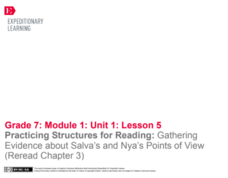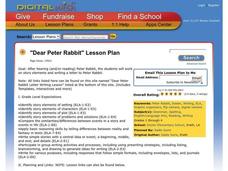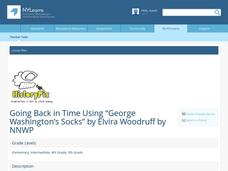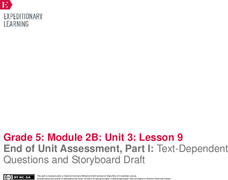EngageNY
Reading Closely: Introducing Chávez’s Commonwealth Club Address and Considering the Plight of the Farmworker
How can a persuasive speech help inspire social change? Scholars read along as they listen to the first half of César Chávez's 1984 speech, "Commonwealth Club Address." Next, pupils use graphic organizers to analyze one of Chávez's...
EngageNY
Practicing Structures for Reading: Gathering Evidence about Salva’s and Nya’s Points of View (Reread Chapter 3)
How does an author develop and contrast character points of view in a work of literature? Using a graphic organizer, readers continue gathering evidence about character point of view from Linda Sue Park's A Long Walk to Water. Next,...
Curated OER
The Boy in the Striped Pajamas: Graphic Organizer: Venn Diagram
Compare and contrast the characters in John Boyne's The Boy in the Striped Pajamas. Using a Venn diagram, kids write in different traits to describe each person, and note their shared characteristics in the middle section.
Teacher Printables
Just the Facts
Show your class how fascinating a text can be by asking them to focus on interesting facts they learned while reading. There are boxes for six facts as well as one large box where pupils can record the most important fact from their...
Do2Learn
Story Organizer
Kids can get all their plot points in line by filling out this graphic organizer with information from a story they have read. Pupils note down the title and author, the characters, the setting, and four events from the story.
Curated OER
Verdi
Third graders explore language arts by answering study questions about a book they read. In this reading summary instructional activity, 3rd graders read the book Verdi by Janell Cannon and identify the plot, characters and sequence of...
Curated OER
Express Yourself Lesson Seed 17: Obituary
The Cay has been criticized by groups such as the Council on Interracial Books for Children because of the way race is portrayed. Explore the argument against the book while taking the author's perspective into account. Class members...
Curated OER
Dear Peter Rabbit
Write dear old Peter Rabbit a letter with this lesson. First, youngsters listen to the story Peter Rabbit and analyze the story elements. Then they complete a story map graphic organizer in order to write a letter to Peter Rabbit using...
Curated OER
Express Yourself Lesson Seed 12: Story Event
Focus on plot and the impact-specific events in The Cay. Class members use their double-entry journals, created in a previous lesson in this series, to record their thinking about the guiding question as they read chapters 15 through 17....
Polk Bros Foundation
Preview Reading
Scanning a text before getting started is a reading strategy that your pupils can use to get a general idea about a text before diving in. Give some direction to their scanning with a worksheet that includes items to check for and space...
State University of New York
Going Back in Time Using “George Washington’s Socks”
After reading Elvira Woodruff's George Washington's Socks, young readers and writers embark upon writing their own historically based story, with a focus on developing ideas and details throughout the piece. In small groups, class...
Curated OER
Express Yourself Lesson Seed 13: Character Development 2
Building upon prior lessons in the series, this reading and writing exercise requires pupils to look back at their own writing, track character development in the novel The Cay, and analyze how Phillip has changed. The reading focus is...
Curated OER
Express Yourself Lesson Seed 2
Use Langston Hughes's poem, "Words Like Freedom," to explore the concepts of freedom and liberty. Learners read the poem, determine the theme, and use the provided graphic organizer to examine the connotative and denotative meanings of...
Freeology
Summarizing
Scholars draft a summary using a graphic organizer featuring a story's characters, setting, main events, conflict, and resolution.
EngageNY
Relationships Between Key Scientific Concepts: What Causes Hurricanes?
A storm is brewing in the sea. Scholars complete multiple reads of How Does a Hurricane Form to determine gist, cause-and-effect relationships, and deepen vocabulary understanding. To finish, they complete graphic organizers to record...
Pearson
Catching the Sun: Tales from Asia
Explore the folklore of Asia and the South Pacific with this language arts lesson series. Complementing a reading of Catching the Sun: Tales from Asia by Jan M. Mike, this resource supports learners with understanding cause and effect...
Curated OER
Hoot: Vocabulary Squares
Study the vocabulary from Carl Hiaasen's Hoot with an activity featuring synonyms and antonyms. Kids fill in a graphic organizer for each word, prompting critical thinking as they find additional ways to put the word into context.
University of Houston
Personal Narratives: Writing, Revising, and Publishing (WRAP)
Writing is a process, and lesson planning is, too! A personal narrative unit stresses the writing process to pupils, who first examine various stories and poems as a model of autobiographical writing and then write their own stories....
Curriculum Corner
Informational Text Graphic Organizers
Scholars delve into an informational text with the help of four pages that focus on the author's purpose, vocabulary words, summarization, and main idea.
EngageNY
End of Unit Assessment, Part 1: Text-Dependent Questions and Storyboard Draft: “You Can Do a Graphic Novel” Excerpt
Eyes on the finish line. Serving as the first part of the end of unit assessment, learners answer questions based on a text about how to write a graphic novel. Using what they've learned, they then create a storyboard about the invention...
K12 Reader
Making Connections to Text
This short reading comprehension worksheet encourages readers to make self-to text, text-to-text, and text-to-world connections as a way of remembering what they have read.
McGraw Hill
Study Guide for Tuck Everlasting
Tuck Everlasting by Natalie Babbitt is a classic novel that readers have enjoyed for years. Resources within the study guide such as discussion and guided reading questions, extension activities, and graphic organizers aid comprehension...
EngageNY
Building Background Knowledge: “War in the Pacific,” Part 2
Who did what? Readers take a closer look at War in the Pacific to determine each country's actions. As they read, scholars underline American actions in one color and actions of Japan in another. They then begin completing Pearl Harbor...
EngageNY
Introducing “If” and Noting Notices and Wonders of the First Stanza
After reading chapter 14 of the story Bud, Not Buddy by Christopher Paul Curtis, scholars take part in a read-aloud of the poem If by Rudyard Kipling and compare it to the reading of Bud, Not Buddy. Learners then go deeper into the poem...

























